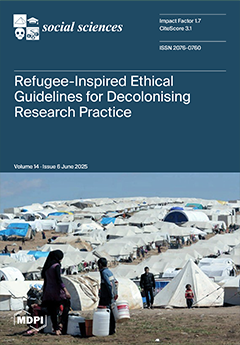Open AccessSystematic Review
Strengthening Family Bonds: A Systematic Review of Factors and Interventions That Enhance Family Cohesion
by
Nicolette V. Roman, Tolulope V. Balogun, Letitia Butler-Kruger, Solomon D. Danga, Janine Therese de Lange, Anja Human-Hendricks, Fundiswa Thelma Khaile, Kezia R. October and Olaniyi J. Olabiyi
Cited by 7 | Viewed by 20395
Abstract
Strong emotional bonds within families are foundational to children’s academic, psychological, and social development. While family cohesion is widely recognized as a protective factor across these domains, there remains a need to understand the specific mechanisms and interventions that foster such cohesion, particularly
[...] Read more.
Strong emotional bonds within families are foundational to children’s academic, psychological, and social development. While family cohesion is widely recognized as a protective factor across these domains, there remains a need to understand the specific mechanisms and interventions that foster such cohesion, particularly in diverse socioeconomic and cultural contexts. This systematic review examines global evidence on factors influencing family cohesion and evaluates intervention strategies designed to strengthen familial relationships. Drawing on 41 peer-reviewed studies published between 2015 and 2023, this review adheres to PRISMA guidelines and applies the Mixed Methods Appraisal Tool (MMAT) to assess methodological quality. The findings are organized around four core dimensions of family cohesion—emotional bonding, adaptability, communication, and support—and highlight both common patterns and culturally specific mechanisms. Studies were drawn from a range of settings including North America, sub-Saharan Africa, Latin America, East and Southeast Asia, and Europe, enabling a cross-cultural analysis of how family cohesion operates under different social, cultural, and economic conditions. Intervention strategies are reviewed separately following the synthesis of correlations, with attention to their effectiveness, cultural relevance, and contextual adaptability. Community-based programs, trauma-informed therapies, and parenting interventions emerge as key approaches, though their success has varied by regional and structural context. Studies consistently demonstrate that higher family cohesion correlates with improved academic outcomes, as supportive home environments promote motivation, reduce stress, and enhance learning. Mental health benefits are also evident, with cohesive and adaptable families mitigating risks of anxiety and depression through open communication and emotional availability. Social competence is fostered through observed and practiced interpersonal skills within family settings. Socioeconomic status emerges as both a challenge and a moderating factor, with lower-SES families facing greater barriers to cohesion but also displaying notable resilience when supported through external interventions. Effective strategies identified include family therapy, parenting education, community-based programs, culturally sensitive approaches, and socioeconomic policy supports. Family cohesion and adaptability are critical to nurturing children’s academic success, emotional well-being, and social development. This review contributes to a more culturally nuanced and policy-relevant understanding of family cohesion by integrating empirical findings across global contexts and identifying both shared and differentiated pathways to resilience. The results inform future program design and suggest priorities for cross-cultural family research and intervention development.
Full article
►▼
Show Figures





